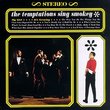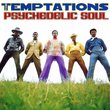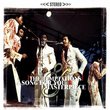| All Artists: Temptations Title: Cloud Nine / Puzzle People Members Wishing: 3 Total Copies: 0 Label: Universal UK Release Date: 12/12/2000 Album Type: Import, Original recording remastered Genres: Pop, R&B Styles: Oldies, Classic R&B, Motown, Soul Number of Discs: 2 SwapaCD Credits: 2 UPC: 601215944624 |
Search - Temptations :: Cloud Nine / Puzzle People
 | Temptations Cloud Nine / Puzzle People Genres: Pop, R&B
UK version of Motown's '2 Classic Albums On 1 CD Series'. Reissue of 2 of the male vocal groups 60's era albums, 'Cloud Nine' (1969) and 'Puzzle People' (1969) together on 1 CD. Packaged in a full color slipcase with origi... more » |
Larger Image |
CD DetailsSynopsis
Album Description UK version of Motown's '2 Classic Albums On 1 CD Series'. Reissue of 2 of the male vocal groups 60's era albums, 'Cloud Nine' (1969) and 'Puzzle People' (1969) together on 1 CD. Packaged in a full color slipcase with original artwork and 8 page booklet. The former LP hit #4 & is available separately in the U.S. with a $9.97 suggested list; the latter reached #5 & is unavailable in the U.S. Similar CDs
|
CD ReviewsBuyer beware A. iverson | los angeles | 06/23/2006 (3 out of 5 stars) "One should be aware that this disc does not contain the original album (Cloud Nine). Runaway Child here is the radio edit, the four minute version as opposed to the nine minute version that appeared on the original album. The editing of songs seems to be a common practice in these Temptation two-fer's. So if you want the entire album as originally issued they should be shyed away from." Norman Whitfield masterclass Laurence Upton | Wilts, UK | 03/28/2005 (4 out of 5 stars) "In their lengthy and varied career the Temptations had many lead vocalists and many producers but perhaps found their own individual niche most successfully with the producer Norman Whitfield. They had worked with him as early as 1964 as the co-writer of Girl (Why You Wanna Make Me Blue) and then on some of their other hit singles, and he logically became their sole producer from mid-1967 (although he continued to produce for other Motown acts).
However, it was through his work with the Temptations that he pioneered the concept of psychedelic soul, taking his lead from the rock fraternity's musical experimentations following in the wake of the Summer Of Love; from student campuses and parks where black and white students were developing a new revolutionary culture; and from peers like Jimi Hendrix and Sly Stone. In the process he became the most audacious auteur producer since Phil Spector, as he concocted ever more complex and ambitious sounds and mould-breaking arrangements. Coupled with Barrett Strong's socially aware lyrics and the Temptations harmonies, featuring new recruit Dennis Edwards' distinctive lead vocals, a new blueprint was forged for soul throughout the 1970s, beginning in 1969 with the single Cloud Nine, targeting the subject of drug abuse, and possibly the first Motown record with a wah-wah guitar. It was also the first track on the LP Cloud Nine, although the centrepiece was a nine-and-a-half minute acid-drenched epic, Run Away Child, Running Wild (also a single in a severely edited form). Norman Whitfield was on a huge roll and Puzzle People followed just five months later, in February 1970, leading with I Can't Get Next To You, on which each of the group take turns to sing lead, and tackling consumer values (Don't Let The Joneses Get You Down) and black issues among its themes. Side one ended with Message From A Black Man, and side two with Slave, sending out clear signals of black consciousness, though the album also contains covers of Hey Jude and, curiously, Little Green Apples (a live album recorded at the Talk Of The Town came out shortly afterwards and was full of standards like The Impossible Dream and Love Theme From Romeo and Juliet, so the Temptations were straddling a very strange fence). All though one could argue with the logic behind some of the album couplings in this series, and wish for more extensive notes, these are good value for money re-issues presented in well mastered stereo" |

 Track Listings (22) - Disc #1
Track Listings (22) - Disc #1


